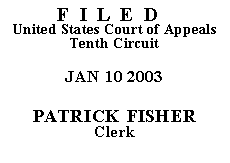

| RUDY PHIL JAQUEZ, |
No. 01-6416 D.C. No. CIV-99-1982-M |
ORDER AND JUDGMENT(*)
Before KELLY, McKAY, and MURPHY, Circuit Judges.
In 1998, appellant Rudy P. Jaquez, Jr. entered a plea of nolo contendere to an Oklahoma state charge of first degree manslaughter. The federal habeas corpus petition which Jaquez filed pursuant to 28 U.S.C. § 2254 was denied by the district court. On February 23, 2001, this court denied Jaquez's request for a certificate of appealability and dismissed his appeal. See Jaquez v. Oklahoma, No. 00-6272, 2001 WL 179813 (10th Cir. Feb. 23, 2001) (unpublished disposition). On September 19, 2001, Jaquez filed a "Motion to Set Aside Default Rule 60 b-3-4-5-6" in federal district court. The district court construed Jaquez's motion as requesting relief from its order denying his § 2254 petition and denied the motion. Jaquez seeks to appeal that decision.
This court has held that post-judgment, Rule 60(b) motions filed in federal habeas proceedings are second or successive habeas petitions under the Antiterrorism and Effective Death Penalty Act of 1996. See Lopez v. Douglas, 141 F.3d 974, 975 (10th Cir. 1998) ("Rule 60(b) cannot be used to circumvent restraints on successive habeas petitions."). Successive habeas petitions cannot be filed in district court until the petitioner "move[s] in the appropriate court of appeals for an order authorizing the district court to consider the application." 28 U.S.C. § 2244(b)(3)(A). Because Jaquez failed to obtain authorization from this court before filing his Rule 60(b) motion, the district court lacked jurisdiction to consider the motion.(1) Accordingly, we must vacate the district court's order denying the motion.
Because we conclude that Jaquez's Rule 60(b) motion is a successive § 2254 petition, we construe Jaquez's application for a certificate of appealability, his appellate brief, and his related motions and miscellaneous filings as an application requesting authorization to file a second or successive habeas petition. See Pease v. Klinger, 115 F.3d 763, 764 (10th Cir. 1997). In order to obtain authorization to file a second § 2254 petition, Jaquez must make the requisite showing under 28 U.S.C. § 2244(b)(2)(A), (B). Our review of Jaquez's implied application leads to the conclusion that he has failed to make the prima facie showing necessary for filing a second or successive § 2254 petition. Accordingly, the district court's order dated October 22, 2001, denying Jaquez's unauthorized § 2254 petition is vacated and Jaquez's implied application for leave to file a second or successive § 2254 petition is denied. Jaquez is reminded that this court's denial of authorization to file a successive habeas corpus petition cannot be subject to a petition for rehearing or a petition for a writ of certiorari. See 28 U.S.C. § 2244(b)(3)(E). In light of this court's construction of Jaquez's filings as a request to file a second or successive § 2254 petition, his motion to proceed in forma pauperis is denied as moot.
ENTERED FOR THE COURT
Michael R. Murphy
Circuit Judge
*. This order and judgment is not binding precedent, except under the doctrines of law of the case, res judicata and collateral estoppel. The court generally disfavors the citation of orders and judgments; nevertheless, an order and judgment may be cited under the terms and conditions of 10th Cir. R. 36.3.
1.When the motion was filed without the required appellate court authorization, it should have been transferred to this court. See Coleman v. United States, 106 F.3d 339, 341 (10th Cir. 1997) ("[W]hen a second or successive petition for habeas corpus relief under § 2254 . . . is filed in the district court without the required authorization by this court, the district court should transfer the petition or motion to this court in the interest of justice pursuant to [28 U.S.C.] § 1631.").